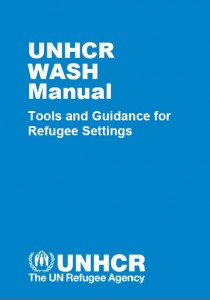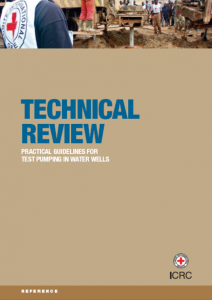
Pumping tests are a practical way of obtaining an idea of the borehole’s efficiency and its optimal production yield. Much of the specialized knowledge and technical expertise needed for this purpose can be gained from the standard literature. However, field operations in remote areas or in difficult conditions often require flexibility and imagination in avoiding or solving technical problems. These guidelines are intended mainly as a practical tool and
therefore contain a minimum of theory. They are aimed at water and habitat engineers working in the field who are undertaking or supervising borehole drilling or rehabilitation
programmes and are not conversant with pumping test procedures.
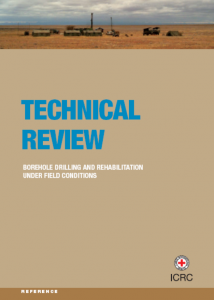
Constructing, or repairing, boreholes requires specialized knowledge and technical expertise, much of which can be gained from the standard literature; but field operations in remote areas or in difficult conditions often require flexibility and imagination in avoiding and solving technical problems. This review is intended as a decision-making tool to assist in making cost-effective choices between borehole drilling methods, and in deciding whether to drill new boreholes or rehabilitate existing sites.
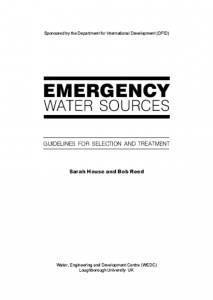
These guidelines have been designed to help those involved in the assessment of emergency water sources to collect relevant information in a systematic way, to use this information to select a source or sources and to determine the appropriate level of treatment required to make the water suitable for drinking.
Tags: Boreholes, Bulk Water Treatment, Drilling, Groundwater, Hand Dug Wells, Handpumps, Household Water Treatment, Piped Water Networks, Rainwater Harvesting, Solar Pumping, Spring Protection, WASH Assessments, WASH Monitoring, WASH Programme Management, Water Prospection and Investigation, Water Pumping, Water Quality Testing and Surveillance, Water Safety Plans, Water Storage, Water Supply, and Water Tankering. Languages: English. Organisations: WEDC. Categories: WASH Emergency Guidelines and WASH Reference Documents.
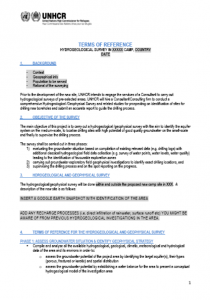
These sample terms of reference may be used should WASH actors working in refugee settings with to engage the services of a Consultant to carry out hydrogeological surveys of pre-selected areas. The terms of reference cover the following areas…
Evaluating the groundwater situation based on compilation of existing relevant data (e.g. drilling logs) with additional classical hydrogeological field data collection (e.g. survey of water points, water levels, water quality) leading to the identification of favourable exploration zones
Carrying out groundwater exploratory field geophysical investigations to identify exact drilling locations, and
Supervising the drilling process and on the spot reporting on the progress.
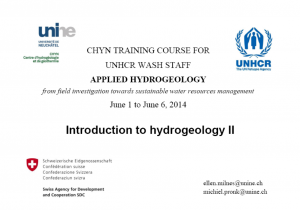
This 289 page document provides and extensive introduction to applied hydrology and includes the following chapters: Introduction to the training course; Introduction to hydrogeology I; Introduction to hydrogeology II; Basic concepts of groundwater exploration; Bacteriological analysis of water; Basic concepts of groundwater protection; Basic concepts of aquifer characterisation: pumping tests; Well construction and rehabilitation
Recharge quantification in semi-arid areas with remote sensing;
 English
English






